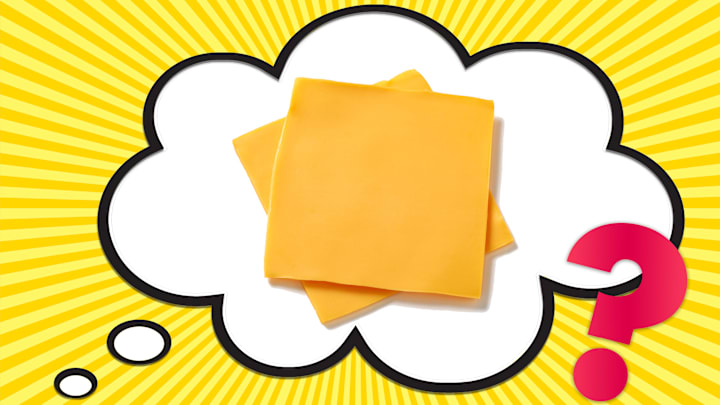When we think of American cheese, we think about that ooey-gooey goodness melted in a fresh-off-the-skillet grilled cheese. Those individually packaged bright orange edible sheets are as American as the 4th of July and apple pie (the latter of which isn’t actually all that American). American cheese is a food that’s perfect in its simplicity ... but what exactly is it?
American cheese—the kind you get in the individual plastic wrappers—is processed cheese or “cheese food,” meaning it’s not actually real cheese. The next time you’re at the grocery store, take a look at the packed singles and notice how many don’t actually have “cheese” in their name. Kraft Singles, for example, are made with milk, whey, milk protein concentrate, milkfat, less than 2 percent of calcium phosphate, salt, sodium citrate, whey protein concentrate, sodium phosphate, sorbic acid as a preservative, cheese culture, enzymes, annatto, and paprika extract (for color). In short, Kraft Singles are made with less than 51 percent actual cheese, so it can’t legally be called “cheese.”
However, not all American cheeses are made equal. Classically—before the factory-processed stuff hit the market—American cheese was a blend, often of cheddar and colby, made for easy melting and approachable flavor. The cheese you find at the deli counter is usually made from real cheese (it may not be wholly cheese, so check the label for the words “Pasteurized Process cheese”). These deli cheeses still have fewer chemicals and extracts than the individually packaged stuff, so they will usually taste fresher and more flavorful.
As J. Kenji López-Alt explains at Serious Eats, the blending of cheese and other ingredients is “what allows American cheese to melt without breaking or turning greasy the way a traditional cheese does. ... The process itself was invented in Switzerland, in an effort to reduce cheese waste; scraps from various batches of cheese could be melted together and formed into a new, delicious product. In 1916, Canadian-American entrepreneur and cheese salesman James Kraft perfected the technique in the US, patented it, and started selling the very first process American cheese.”
Though “American cheese” describes that familiar sandwich staple, it does not encompass everything that truly is “American” and “cheese.” When it comes to cheeses made here in the U.S., there’s more than what comes in blocks and singles.
American Cheeses for Your Consideration
If you’re looking for an American cheese that’s perfect for snacking and melting, look no further than Pleasant Ridge Reserve from Uplands Cheese. This Wisconsin beauty has won more awards than any other American cheese. It took home the American Cheese Society’s Best of Show in 2001, 2005, and 2010, and it won the U.S. Cheese Championships in 2003.
Or maybe you want something a little brighter for summer. LaClare Farms’ Evalon is an aged goat cheese that’s lemony, sharp, and just a little grassy. It also took home the U.S. Cheese Championship in 2011 so, needless to say, it’s a real winner.
Rogue River Blue, an Oregon original, is a smoky blue cheese that’s been aged in pear brandy-soaked grape leaves. Or if you’re more of a funky and creamy cheese explorer, Winnimere from Vermont’s Jasper Hill Farm is an absolute dream. It has an unmatched velvety texture while maintaining a distinct woodsy and mushroomy flavor.
Lastly, when it comes to American cheese, Cowgirl Creamery in Northern California is really pushing the American cheese revolution. One taste of their Mt. Tam and you’ll be hooked.
So the next time you’re thinking about making a grilled cheese, explore the cheese counter a little further and try something new that will rock your red-white-and-blue world.
A version of this article was originally published in 2016 and has been updated for 2023.
